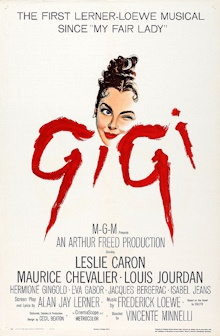This was added to my list at some point because it is a highly celebrated film with many awards and is considered one of the last of the great musicals of the era. So when its very first big song, Thank Heaven for Little Girls, started up, I was shocked by the very obvious pedophiliac message in it. Things just get worse from there and the whole thing seems like a very malicious caricature of the French conception to love and romance. It’s a pretty film to be sure as it really was shot in Paris and even features scenes in the famous Maxim’s restaurant. But the music is banal and the morals are execrable as few other films are. I cannot believe that this film is as highly regarded as it still seems to be.
Honoré Lachaille is a wealthy playboy who is getting on in years but still revels in his libertine lifestyle. He appears set on passing on his habits to his nephew Gaston who is so rich that he has seen and done it all and so is bored with everything. Nonetheless he regularly visit a family friend Madame Alvarez who is raising her granddaughter Gigi. She is apparently being trained by Alvarez and her glamorous great-aunt Alicia to be a proper lady with a view towards becoming a courtesan. Gaston considers Gigi to be a little girl but enjoys playing little games and going out with her. Meanwhile he is upset with his latest mistress who he suspects of having an affair and arranges for her to be publicly humiliated. After that Honoré advises him to host a series of parties in Paris to show that he is unaffected by the breakup though he is similarly bored by such events. Eventually Gigi convinces him to take her and her aunt with him to the seaside at Trouville. There, Honoré and Alvarez meet and reminiscence about their past romance together while noticing how much Gaston seems to be enjoying his time with Gigi. Back in Paris, Alicia and Alvarez intensify Gigi’s training to turn her into Gaston’s mistress.
I found this film to be so offensive on so many levels that it’s hard to even know where to begin. Honoré’s song about little girls clearly values them as future sex objects for their innocence and adorableness. Gigi’s mother is never seen on screen because she is a singer. Combined with how Alicia was a courtesan who has served kings and the nobility, it appears that the entire family consists of disreputable women who are unsuited for marriage. I wondered why Gaston would be friends with Alvarez but upon reflection it might simply be that they have a long history of proving female entertainment to his family. The film is never so crass as to explicitly mention sex but even Gigi knows that she is expected to sleep with Gaston and will be discarded by him in a matter of months once he tires of her. In exchange, Alicia negotiates for her to get a nice house with servants, a car and jewelry. As my wife noted, we’ve seen this kind of plot before in films like Pretty Woman, but the scenario here is especially revolting because Gaston has always known Gigi as a child and indeed, expresses a preference for her in her juvenile clothes rather than a classy gown. It’s so egregiously wrong that it’s hard to imagine how this could ever have been made.
The film has the vibrant, colorful palette favored by musicals and the costumes are gorgeous as you might expect. There’s also something genuinely magical about this being an expensive Hollywood production of the era that is genuinely shot in Paris. I found the songs to all be bland however, even Say a Prayer for Me Tonight which was originally written for My Fair Lady. But none of this makes up for the awful story and the disgusting morals that are proudly on display. I mean at one point Gaston’s mistress attempts suicide and it is played off as a joke because it is only the latest theatrical attempt rather than a serious one. I suspect that the Americans allowed themselves to make this only because they perceived it as a kind of twisted caricature of French attitudes to sex and romance. Yet it’s tough to entirely blame the Americans for this as so many of the actors are themselves French. How could they not see this as a kind of malicious attack on French culture?
It’s undeniable that the people of the era judged this film differently, so a sexual relationship between a girl of perhaps fourteen to fifteen with a man more than twice her age was socially acceptable and someone like Honoré could be considered a sweet old man rather than a lecherous pervert. Certainly social mores and values have changed since then and I would say it’s undoubtedly for the better. Maybe this film might have some redeeming value if it were original or innovative in some way but it isn’t. And so I wouldn’t hesitate to say that it’s a steaming pile of crap and deserves to be set on fire.
